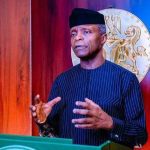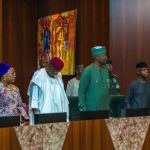Vice President, Yemi Osinbajo has called for adherence to sound ethical practices by all stakeholders for the development and sustenance of viable enterprises and corporations which he said is no longer dependent on the size of the corporation and related factors.
Prof. Osinbajo stated this on Tuesday at the virtual 2020 Conference of the Institute of Directors.
According to him, “The frequent clashes between conscience and wrongful behavior will eventually create a toxic work environment and destroy corporate objectives and visions. There is also enough history of how cutting corners and dishonesty ultimately bring down the whole enterprise. This we have seen in the facts behind the collapse of many Nigerian financial institutions from the nineties to the more recent occurrences in 2009. Yes, it took a while for the institutions to unravel but the point is made that on the long run, unethical practices are unsustainable.
“Besides for quoted companies, the dangers of unethical behavior are much graver. Local and international investors have greater access to information and more options than ever before, the slightest whiff of scandal or malfeasance can destroy value built up over the years.
The local and especially the international examples of the collapse of companies thought to be too big to fail and brand names that had even once been associated with integrity and strong business ethics is a strong reminder of just how brittle edifices built on weak business ethics are.
According to the Vice President “Today, every company’s stakeholders are far more than investors, management, or employees. They now include customers, clients, trade partners, suppliers, media, the general public, government and now, the environment.”
The event featured presentations to personalities including Prof. Marc Le Menestrel, a professor of Decision Sciences; Chairman of Governing Council, Institute of Directors, Chief Chris Okunowo; and Dele Alimi, DG/CEO, Institute of Directors.
Vice President, Yemi Osinbajo has called for adherence to sound ethical practices by all stakeholders for the development and sustenance of viable enterprises and corporations which he said is no longer dependent on the size of the corporation and related factors.
Prof. Osinbajo stated this on Tuesday at the virtual 2020 Conference of the Institute of Directors.
According to him, “The frequent clashes between conscience and wrongful behavior will eventually create a toxic work environment and destroy corporate objectives and visions. There is also enough history of how cutting corners and dishonesty ultimately bring down the whole enterprise. This we have seen in the facts behind the collapse of many Nigerian financial institutions from the nineties to the more recent occurrences in 2009. Yes, it took a while for the institutions to unravel but the point is made that on the long run, unethical practices are unsustainable.
“Besides for quoted companies, the dangers of unethical behavior are much graver. Local and international investors have greater access to information and more options than ever before, the slightest whiff of scandal or malfeasance can destroy value built up over the years.
The local and especially the international examples of the collapse of companies thought to be too big to fail and brand names that had even once been associated with integrity and strong business ethics is a strong reminder of just how brittle edifices built on weak business ethics are.
According to the Vice President “Today, every company’s stakeholders are far more than investors, management, or employees. They now include customers, clients, trade partners, suppliers, media, the general public, government and now, the environment.”
The event featured presentations to personalities including Prof. Marc Le Menestrel, a professor of Decision Sciences; Chairman of Governing Council, Institute of Directors, Chief Chris Okunowo; and Dele Alimi, DG/CEO, Institute of Directors.
Vice President, Yemi Osinbajo has called for adherence to sound ethical practices by all stakeholders for the development and sustenance of viable enterprises and corporations which he said is no longer dependent on the size of the corporation and related factors.
Prof. Osinbajo stated this on Tuesday at the virtual 2020 Conference of the Institute of Directors.
According to him, “The frequent clashes between conscience and wrongful behavior will eventually create a toxic work environment and destroy corporate objectives and visions. There is also enough history of how cutting corners and dishonesty ultimately bring down the whole enterprise. This we have seen in the facts behind the collapse of many Nigerian financial institutions from the nineties to the more recent occurrences in 2009. Yes, it took a while for the institutions to unravel but the point is made that on the long run, unethical practices are unsustainable.
“Besides for quoted companies, the dangers of unethical behavior are much graver. Local and international investors have greater access to information and more options than ever before, the slightest whiff of scandal or malfeasance can destroy value built up over the years.
The local and especially the international examples of the collapse of companies thought to be too big to fail and brand names that had even once been associated with integrity and strong business ethics is a strong reminder of just how brittle edifices built on weak business ethics are.
According to the Vice President “Today, every company’s stakeholders are far more than investors, management, or employees. They now include customers, clients, trade partners, suppliers, media, the general public, government and now, the environment.”
The event featured presentations to personalities including Prof. Marc Le Menestrel, a professor of Decision Sciences; Chairman of Governing Council, Institute of Directors, Chief Chris Okunowo; and Dele Alimi, DG/CEO, Institute of Directors.
Vice President, Yemi Osinbajo has called for adherence to sound ethical practices by all stakeholders for the development and sustenance of viable enterprises and corporations which he said is no longer dependent on the size of the corporation and related factors.
Prof. Osinbajo stated this on Tuesday at the virtual 2020 Conference of the Institute of Directors.
According to him, “The frequent clashes between conscience and wrongful behavior will eventually create a toxic work environment and destroy corporate objectives and visions. There is also enough history of how cutting corners and dishonesty ultimately bring down the whole enterprise. This we have seen in the facts behind the collapse of many Nigerian financial institutions from the nineties to the more recent occurrences in 2009. Yes, it took a while for the institutions to unravel but the point is made that on the long run, unethical practices are unsustainable.
“Besides for quoted companies, the dangers of unethical behavior are much graver. Local and international investors have greater access to information and more options than ever before, the slightest whiff of scandal or malfeasance can destroy value built up over the years.
The local and especially the international examples of the collapse of companies thought to be too big to fail and brand names that had even once been associated with integrity and strong business ethics is a strong reminder of just how brittle edifices built on weak business ethics are.
According to the Vice President “Today, every company’s stakeholders are far more than investors, management, or employees. They now include customers, clients, trade partners, suppliers, media, the general public, government and now, the environment.”
The event featured presentations to personalities including Prof. Marc Le Menestrel, a professor of Decision Sciences; Chairman of Governing Council, Institute of Directors, Chief Chris Okunowo; and Dele Alimi, DG/CEO, Institute of Directors.
Vice President, Yemi Osinbajo has called for adherence to sound ethical practices by all stakeholders for the development and sustenance of viable enterprises and corporations which he said is no longer dependent on the size of the corporation and related factors.
Prof. Osinbajo stated this on Tuesday at the virtual 2020 Conference of the Institute of Directors.
According to him, “The frequent clashes between conscience and wrongful behavior will eventually create a toxic work environment and destroy corporate objectives and visions. There is also enough history of how cutting corners and dishonesty ultimately bring down the whole enterprise. This we have seen in the facts behind the collapse of many Nigerian financial institutions from the nineties to the more recent occurrences in 2009. Yes, it took a while for the institutions to unravel but the point is made that on the long run, unethical practices are unsustainable.
“Besides for quoted companies, the dangers of unethical behavior are much graver. Local and international investors have greater access to information and more options than ever before, the slightest whiff of scandal or malfeasance can destroy value built up over the years.
The local and especially the international examples of the collapse of companies thought to be too big to fail and brand names that had even once been associated with integrity and strong business ethics is a strong reminder of just how brittle edifices built on weak business ethics are.
According to the Vice President “Today, every company’s stakeholders are far more than investors, management, or employees. They now include customers, clients, trade partners, suppliers, media, the general public, government and now, the environment.”
The event featured presentations to personalities including Prof. Marc Le Menestrel, a professor of Decision Sciences; Chairman of Governing Council, Institute of Directors, Chief Chris Okunowo; and Dele Alimi, DG/CEO, Institute of Directors.
Vice President, Yemi Osinbajo has called for adherence to sound ethical practices by all stakeholders for the development and sustenance of viable enterprises and corporations which he said is no longer dependent on the size of the corporation and related factors.
Prof. Osinbajo stated this on Tuesday at the virtual 2020 Conference of the Institute of Directors.
According to him, “The frequent clashes between conscience and wrongful behavior will eventually create a toxic work environment and destroy corporate objectives and visions. There is also enough history of how cutting corners and dishonesty ultimately bring down the whole enterprise. This we have seen in the facts behind the collapse of many Nigerian financial institutions from the nineties to the more recent occurrences in 2009. Yes, it took a while for the institutions to unravel but the point is made that on the long run, unethical practices are unsustainable.
“Besides for quoted companies, the dangers of unethical behavior are much graver. Local and international investors have greater access to information and more options than ever before, the slightest whiff of scandal or malfeasance can destroy value built up over the years.
The local and especially the international examples of the collapse of companies thought to be too big to fail and brand names that had even once been associated with integrity and strong business ethics is a strong reminder of just how brittle edifices built on weak business ethics are.
According to the Vice President “Today, every company’s stakeholders are far more than investors, management, or employees. They now include customers, clients, trade partners, suppliers, media, the general public, government and now, the environment.”
The event featured presentations to personalities including Prof. Marc Le Menestrel, a professor of Decision Sciences; Chairman of Governing Council, Institute of Directors, Chief Chris Okunowo; and Dele Alimi, DG/CEO, Institute of Directors.
Vice President, Yemi Osinbajo has called for adherence to sound ethical practices by all stakeholders for the development and sustenance of viable enterprises and corporations which he said is no longer dependent on the size of the corporation and related factors.
Prof. Osinbajo stated this on Tuesday at the virtual 2020 Conference of the Institute of Directors.
According to him, “The frequent clashes between conscience and wrongful behavior will eventually create a toxic work environment and destroy corporate objectives and visions. There is also enough history of how cutting corners and dishonesty ultimately bring down the whole enterprise. This we have seen in the facts behind the collapse of many Nigerian financial institutions from the nineties to the more recent occurrences in 2009. Yes, it took a while for the institutions to unravel but the point is made that on the long run, unethical practices are unsustainable.
“Besides for quoted companies, the dangers of unethical behavior are much graver. Local and international investors have greater access to information and more options than ever before, the slightest whiff of scandal or malfeasance can destroy value built up over the years.
The local and especially the international examples of the collapse of companies thought to be too big to fail and brand names that had even once been associated with integrity and strong business ethics is a strong reminder of just how brittle edifices built on weak business ethics are.
According to the Vice President “Today, every company’s stakeholders are far more than investors, management, or employees. They now include customers, clients, trade partners, suppliers, media, the general public, government and now, the environment.”
The event featured presentations to personalities including Prof. Marc Le Menestrel, a professor of Decision Sciences; Chairman of Governing Council, Institute of Directors, Chief Chris Okunowo; and Dele Alimi, DG/CEO, Institute of Directors.
Vice President, Yemi Osinbajo has called for adherence to sound ethical practices by all stakeholders for the development and sustenance of viable enterprises and corporations which he said is no longer dependent on the size of the corporation and related factors.
Prof. Osinbajo stated this on Tuesday at the virtual 2020 Conference of the Institute of Directors.
According to him, “The frequent clashes between conscience and wrongful behavior will eventually create a toxic work environment and destroy corporate objectives and visions. There is also enough history of how cutting corners and dishonesty ultimately bring down the whole enterprise. This we have seen in the facts behind the collapse of many Nigerian financial institutions from the nineties to the more recent occurrences in 2009. Yes, it took a while for the institutions to unravel but the point is made that on the long run, unethical practices are unsustainable.
“Besides for quoted companies, the dangers of unethical behavior are much graver. Local and international investors have greater access to information and more options than ever before, the slightest whiff of scandal or malfeasance can destroy value built up over the years.
The local and especially the international examples of the collapse of companies thought to be too big to fail and brand names that had even once been associated with integrity and strong business ethics is a strong reminder of just how brittle edifices built on weak business ethics are.
According to the Vice President “Today, every company’s stakeholders are far more than investors, management, or employees. They now include customers, clients, trade partners, suppliers, media, the general public, government and now, the environment.”
The event featured presentations to personalities including Prof. Marc Le Menestrel, a professor of Decision Sciences; Chairman of Governing Council, Institute of Directors, Chief Chris Okunowo; and Dele Alimi, DG/CEO, Institute of Directors.














